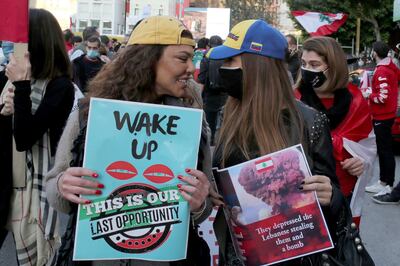Hundreds of protesters marched in Beirut on Friday against a corrupt ruling class that has failed to solve Lebanon's deepening economic crisis.
The demonstrators, most of them young Lebanese, held banners demanding the demise of the sectarian leadership and chanted “the people want the fall of the regime” while they marched from the Energy Ministry to the city centre.
Rayan, 16, said all he wants is a future in his country.
“We want to build a nation where we can live, not just survive,” he said, waving a national flag.
“We want to live in peace, we want money for our parents, we want medicine and food.”

The country has been financially collapsing since late 2019 yet has been ruled by a caretaker government for the past eight months as political leaders bicker over the composition of the next Cabinet.
Decades of mismanagement, corruption and a shortage in foreign currency have slashed the value of the Lebanese pound, pushing more than half of the population into poverty, according to UN data.
Groups that emerged from mass anti-government protests that shook the country in October 2019 called for Friday’s march, the second in two weeks, to revive the movement amid political deadlock and ahead of the 2022 municipal and parliamentary elections.
At its height, the movement gathered more than one million people but lost its momentum in the face of the coronavirus pandemic, political inaction and intimidation by supporters of the political elite.
About 2,000 people attended last week’s march and while numbers dwindled this week, protesters say change remains possible.
Layla, 14, travelled from the northern city of Tripoli to make her voice heard in the capital.
“Our only hope to build this country are the next elections, we have to support independent parties in 2022,” she said.
A multitude of independent political and civil society groups rose from the protest movement but failed to unite, with divisions focused mainly on Hezbollah’s arms. The groups that called for the marches agree on the need for a transitional government to save Lebanon and reject the political class.
Paola Rebeiz, 52, is an early supporter of the October movement. She raised money to buy protesters food and managed one of the tents set up at Beirut’s protest centre in Martyrs’ Square.
Walking past the empty plaza on Friday, she recalled a time when it was filled with hundreds of thousands of people who united against their political leaders and dreamed of a better tomorrow.
“The important thing is that we are still on the streets,” she said.
A communication expert, Ms Rebeiz lost most of her clients because they disapproved of her activism.
Despite being deprived of her source of income and seeing the movement lose momentum, she said she has no regrets and will continue to take to the streets.


